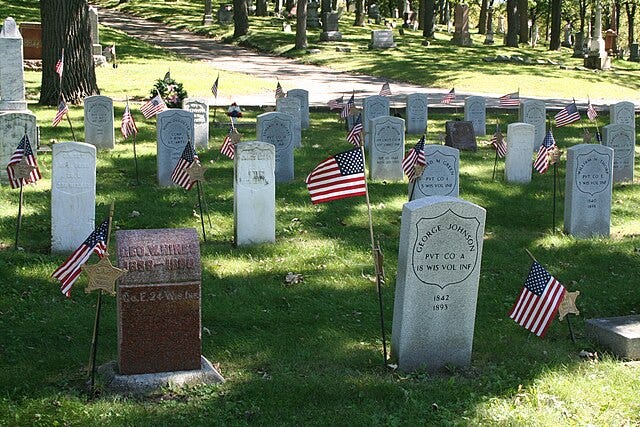When I was a kid, we looked forward to Memorial Day, the beginning of summer. Never mind that we still had several weeks of school left before what Joseph Heller called “a ten-week summer vacation that lasted a hundred thousand years and still ended too soon.”
Late May was a time of cherry blossoms and lilacs. Sparkling sunshine and kites and the pungent green aroma that came with the first mowing of lawns.
The main event in our small town was the parade. First the endless wait while residents from outlying areas drifted in and set up folding chairs along Main Street. Then the distant drums, the flashing lights of a police car leading the way, the school band playing Sousa, the fire trucks bringing up the rear.
To most children, the one thing Memorial Day was not about, was war. Many of our fathers, mine included, and some of our mothers, had been to war. But they had locked away that part of their lives.
Our insouciance was due to their generosity. They had seen enough of war. They had experienced the heartbreak of comrades, brothers, and sons sacrificed on foreign fields to defend an idea. They didn’t want to talk about it.
World War II swept up 16,400,000 American service men and women. More than 400,000 gave their lives. Today, only about 66,000 of these veterans remain, far less than 1 percent. Their average age is 98. They fought against fascism, against the bullying of tin horn potentates, against the cruelty of concentration camps.
On the home front, folks fearfully scanned casualty lists and withstood the shocking news — Pearl Harbor, Guadalcanal, Anzio, D-Day. They had seen dreams dashed, lives put on hold. Now they wanted no more bloodshed or suffering or atrocities.
We kids had the privilege of thinking about things other than death. Yes, there were the cars carrying solemn Gold Star mothers. Yes, the parade ended at the local cemetery. The graves of the war dead had been specially tended by the families of those whose lives and potential had been cut short. Taps sounded from over the hill — Day is done/ Gone the sun. The somber notes were chased away by the sharp crack of rifles firing a salute. We later found the empty brass cartridges in the grass and used them as whistles.
Looking back, looking around the world, I realize the great value of a childhood graced with the gift of peace. Certainly the Cold War injected an element of anxiety. But atomic armageddon was easy to ignore on sunny days. We prayed for peace at church and scurried out to play.
Older folks still called it Decoration Day. The holiday had originally marked a time to tidy the graves of the dead from the Civil War, lest the memory of their sacrifice fade. Tradition called for flags to be mounted near headstones, artificial poppies to be worn on lapels. We festooned our bicycles with crepe paper.
But the secret was kept from us. The great trauma of the War, which for many adults remained a vivid, scalding memory. Or worse, an empty chair at the kitchen table.
Images of the Memorial Days of my youth came back to me in 2006, when we gathered to bury my father, a master sergeant who had served in North Africa and Italy. He had been drafted into the army before the war began. He served for the duration, giving up five years beginning when he was already twenty-five. It was a significant chunk of his best years.
The Army sent a color guard to his funeral. The bugler blew taps from a distance. A soldier read a stark account of the campaigns my father had joined, noted his medals and commendations. They fired rifles in farewell and folded the flag that draped his casket.
Now, Memorial Day, if it is about anything, is about what its name implies — remembering. Remembering my father. Remembering the cost and the sacrifice. Remembering what they fought for, what they fought against.
In 1837, Ralph Waldo Emerson noted that a Revolutionary War monument was being erected at Concord Bridge so that “memory may their deed redeem, when, like our sires, our sons are gone.” It was, he wrote, a celebration of the “spirit, that made those heroes dare to die, and leave their children free.”







Beautifully done.
Hi Jack. We had so many good things as kids and nothing seemed to be bad or anything to worry about, so very thankful you shared some of your childhood memories. I have to say I pray there will be a time that war is never going to happen. I know you're probably thinking, yeah, right, but I'm going keep on praying for that blessing.